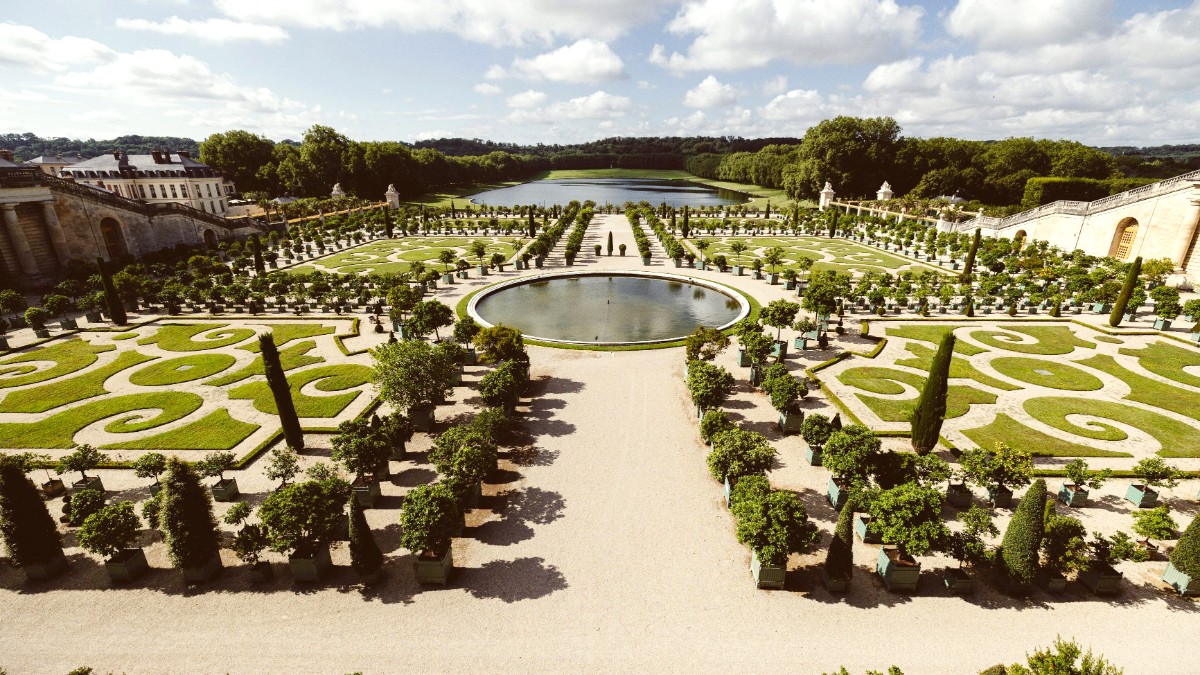
France
Each season presents unique advantages for a Versailles visit. Climate patterns vary throughout the year, shaping visitor experiences.
Spring (April-May): Mild, pleasant temperatures (50-65°F / 10-18°C) with moderate, occasional rain. Gardens burst with blooms. Mornings cool, afternoons warm.
Summer (June-August): Warmest, 65-80°F (18-27°C), sometimes exceeding 85°F (30°C). Less frequent rain, but thunderstorms occur. Long daylight hours.
Autumn (September-October): Similar to spring, 50-65°F (10-18°C), often sunny. Moderate rain. Changing foliage paints the gardens.
Winter (November-March): Cold (35-45°F / 2-7°C), frequent drops below freezing. Wettest period, rain, occasional snow. Shorter days. Palace interiors less crowded.
Summer Heatwaves: If visiting in summer, prepare for potential heatwaves. Hydrate by carrying a reusable water bottle, refilling at designated points. Seek shade in the gardens or spend more time inside the air-conditioned palace. Plan outdoor activities for early mornings or late afternoons.
Winter Dampness: Winter in Versailles feels chilly due to dampness. Pack waterproof outer layers and warm, insulating clothing.
Warmest, most crowded
Warm, generally sunny weather. All attractions operating. Longer daylight hours.
Longer queues for entry. Peak prices for lodging and flights. Potential for extreme heat.
Pleasant, fewer crowds
Pleasant weather, fewer crowds. Gardens beautiful with blooms or autumn colors. Reasonable prices.
Weather variability, cooler days or rain. Reduced hours for some attractions.
Fewest crowds, lower prices
Fewest crowds for palace interiors. Lowest prices for lodging and flights. Serene atmosphere.
Cold, damp weather, shorter daylight hours. Fountains inactive. Gardens lack summer vibrancy.
France is part of the Schengen Area, simplifying travel for many. Citizens of countries like the United States, Canada, Australia, and the United Kingdom can enter for tourism or business for up to 90 days within any 180-day period without a visa. This "90/180-day rule" is a point of note for longer trips or multiple entries. Beginning in 2025, non-EU citizens who currently travel visa-free to the Schengen Area will apply for an ETIAS authorization. This electronic travel authorization is not a visa, akin to the ESTA in the US. You will apply online before your trip. The authorization is valid for three years or until your passport's expiration, allowing multiple entries. The cost is around €7. Look to official EU sources for the precise launch date and portal. Travelers from other countries not under visa-free or ETIAS schemes will apply for a Schengen visa (short-stay visa) through the French embassy or consulate in their home country. This usually means an application form, passport, photos, proof of lodging, itinerary, financial means, and travel insurance. Begin this process well before your departure.
Currently, France has no specific health-related entry requirements for general tourism. Your routine vaccinations are current before any international trip. Consult your doctor for personal recommendations based on your health history and travel plans.
Valid for at least three months beyond your planned departure from the Schengen Area, issued within the last 10 years, with at least two blank pages.
Airlines might ask for proof of your departure from the Schengen Area (e.g., a return flight ticket).
Immigration officers might ask for evidence of financial resources for your stay (bank statements, credit card statements, bank letter).
Highly recommended. For Schengen visa applicants, it is a mandatory requirement, covering medical emergencies, hospitalization, and repatriation expenses (typically €30,000+).
No general entry fee for France. Standard immigration procedures upon arrival at Paris airports.
Prices vary significantly based on lodging, dining, and activity choices.
The Euro (€) is France's official currency. ATMs are common in Versailles and Paris for Euro withdrawals at competitive rates. Notify your bank of travel to avoid security freezes. Credit and debit cards (Visa/Mastercard) are widely accepted. Smaller shops or market stalls prefer cash.
Costs fluctuate by season and booking time.
Lodging: Luxury hotel, possibly within the Château grounds or a high-end property (€200+).
Meals: Fine dining, including Michelin-starred restaurants or exclusive options (€100+).
Transportation: Private transfers, frequent taxi/ride-share use, or chauffeured car.
Attractions: Private guided tours, exclusive after-hours experiences, Royal Opera House tickets, unlimited golf cart rentals.
France has excellent healthcare facilities and is generally a safe country for travelers.
No vaccinations are necessary for France beyond routine immunizations.
Ensure routine vaccinations (MMR, DTP, Varicella) are current. Consult your doctor 4-6 weeks before your trip.
Practice good hand hygiene. Tap water in France is safe. Eat at reputable places. Over-the-counter remedies are available at pharmacies.
Summer Heatwaves:
Summer heatwaves can be intense. Use a Broad-spectrum sunscreen (SPF 30+). Wear a Wide-brimmed hat and Sunglasses. Hydrate with plenty of water. Seek shade, especially during the hottest parts of the day. Plan outdoor activities for early mornings or late afternoons.
Blisters are common with extensive walking in Versailles. Wear comfortable, broken-in walking shoes. Carry blister pads or Moleskin in your daypack.
Cold/Flu (Winter): Colder, damp weather in winter can increase respiratory illness risk. Dress in warm layers, wash hands frequently.
Dial 112 for police, fire, and ambulance services across Europe.
Pharmacies (green cross sign) offer advice for minor issues. For more serious conditions, consult a general practitioner. The Centre Hospitalier de Versailles is the main hospital.
Tap water in France is potable. Food hygiene standards are high. Eat at reputable establishments.
Versailles is generally safe for tourists. Violent crime is rare.
Knowing who to call in an emergency is important. Keep these numbers, and your travel insurance emergency contact, in a safe and accessible place. Have digital and physical copies of your passport, visa, and travel insurance policy.
112 (European Emergency Number: Police, Fire, Ambulance)
17 (Local Police non-emergency), 18 (Fire), 15 (Medical Emergency SAMU)
US Embassy: +33 1 43 12 22 22; Canadian Embassy: +33 1 44 43 29 00; UK Embassy: +33 1 44 51 31 00